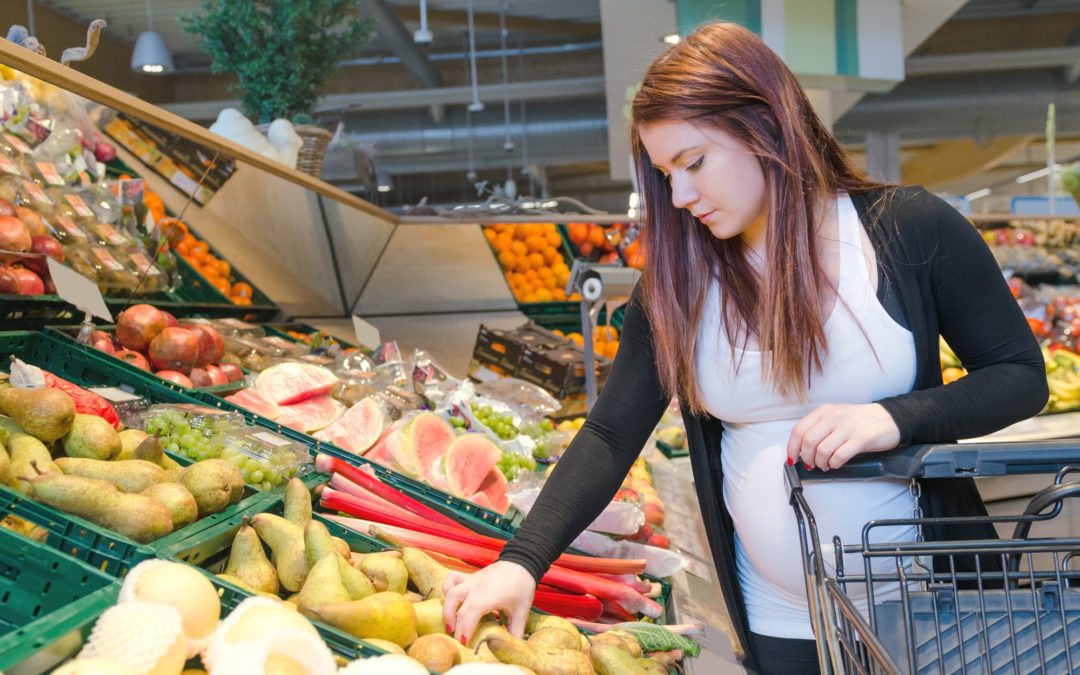Pregnant women need to pay special attention to their diet to be sure they are eating nutritious foods and avoiding added fats, sugar, alcohol, caffeine and toxins. A 100% whole food, plant-based diet that emphasizes organic food, along with a prenatal vitamin and vitamin B12, is perfectly safe for mother and baby. In fact, this diet helps women avoid toxins from eating fish contaminated with mercury and the antibiotics, hormones and saturated fat found in meat products. It also may help prevent many of the problems pregnant women on the Standard American Diet face. This includes preeclampsia, gestational diabetes, and large babies who cannot fit through their mother’s birth canal and must be delivered via Caesarian Section.
Preeclampsia symptoms include high blood pressure (hypertension) and extra protein in urine. It can cause damage to blood vessels, the kidneys and liver. Contributing factors include obesity and eating fast foods with high levels of saturated fat. In a study of 775 vegan mothers, only one had preeclampsia, suggesting that a vegan diet can help prevent this condition.
With gestational diabetes, a women’s body is not able to make and use all the insulin it needs resulting in high blood sugar (glucose) levels, also known as hyperglycemia. This condition can lead to fat babies who are at an increased risk of breathing difficulties and obesity and Type 2 diabetes later in their lives. A low-glycemic plant-based diet in which you avoid added sugar, processed foods and simple carbohydrates (like white flour and white rice), and been shown to reduce the risk of diabetes. In a 2011 study, egg and cholesterol consumption was associated with a higher incidence of gestational diabetes.
Tips for a healthy plant-based pregnancy:
- Eat whole grains, beans and legumes (including soy), vegetables, fruit, seeds and nuts (Read PCRM.org’s recommendations on serving sizes). Avoid highly processed foods and added sugar and salt.
- Select organic foods whenever possible to avoid pesticides and herbicides. Visit the Environmental Working Group site to view the list of foods to always buy organic, called the dirty dozen.
- Protein: Choose from whole grains, legumes, beans, nuts, seeds, and soy products.
- Essential fatty acids: flax seeds and flax oil, canola oil, and walnuts all contain Alpha-linolenic Acid (ALA) which your body converts to Omega 3 fatty acids. Omega 6 fatty acids are found in seeds, nuts, legumes, green leafy vegetables and grains.
- Calcium: According to the National Academies of Sciences, all women between the ages of 19 and 50 should get 1,000 mg of calcium per day. This recommended level does not increase during pregnancy and lactation. Calcium sources include fortified soy milk and orange juice, calcium-set tofu, dark green leafy vegetables like kale and broccoli, beans, sunflower seeds, tahini, figs and almonds. According to PCRM.org “calcium absorption from plant foods is often superior to that of dairy products.” By eating calcium-rich plant foods from the list above each day, calcium needs are easily met.
- Supplements: take vitamin B12 and a consider a prenatal vitamin. Work with your doctor to make sure you are getting enough folate, iron, iodine, Vitamin D and Zinc.
For more information on adopting a healthy whole food, plant-based diet during your pregnancy, visit PCRM.org’s “Vegetarian Diets for Pregnancy” and The McDougall Diet for Pregnancy.


Useful tips and information. Thank you very much!!
It’s very useful and informative!!